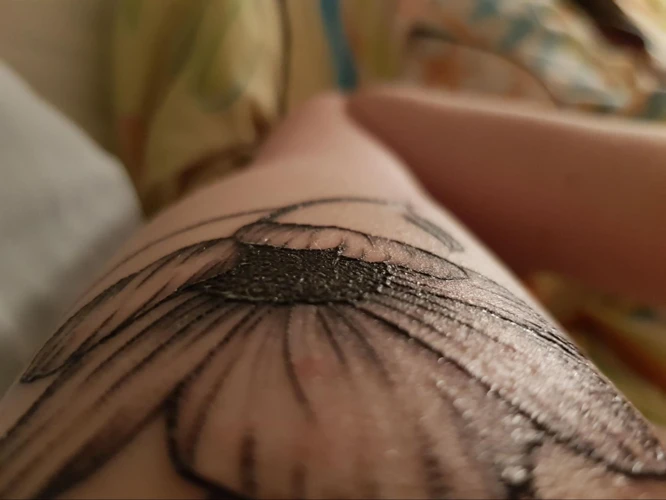Having a raised tattoo can be a real eyesore and detract from the overall look of your ink. Fortunately, there are some simple and quick tips that can help you flatten a raised tattoo and get perfect ink results. In this article, we will discuss how to flatten a raised tattoo and provide some tips for achieving perfect ink results.
Contents
Causes of a Raised Tattoo

Scarring
Scarring is the most common cause of a raised tattoo. During the healing process, the cells of the skin heal in an uneven pattern, resulting in raised, bumpy areas. It is important to follow the aftercare instructions provided by your tattoo artist for best results.
Allergies
Allergic reactions to the ink, the products used to care for the tattoo, or the clothing worn while healing can also cause a raised tattoo. If you experience any redness, itching, or hives near the tattoo, contact your tattoo artist or doctor immediately.
Poor Aftercare
Not following the aftercare instructions provided by your tattoo artist can also result in a raised tattoo. This includes not cleaning the area enough or not keeping the area moisturized. To keep your tattoo looking great, follow the aftercare instructions closely.
If you already have a raised tattoo, there are steps you can take to help flatten the area. Follow these quick tips to help flatten a raised tattoo.
Prevention of Raised Tattoos

Find a Professional Tattoo Artist
Finding a reliable and experienced tattoo artist is essential for preventing raised tattoos. Look for an artist with a portfolio of work and excellent reviews. Make sure they are knowledgeable about the right needle and tattooing techniques, have a good eye for detail, and use high-quality ink and equipment.
Follow Aftercare Instructions
Aftercare is important to ensure your tattoo heals well and the ink remains intact. Follow your tattoo artist’s aftercare instructions carefully, including keeping the area clean, moisturized, and protected from the sun. It’s also best to avoid long hot baths and swimming. If you experience any redness, swelling, or discharge, contact your tattoo artist right away.
Treating a Raised Tattoo
Keep the Area Clean
It is important to keep the area clean when treating a raised tattoo. Use a gentle soap and warm water to clean the area gently. Avoid using any scrubbing or abrasive materials, as this can further irritate the skin and make the raised tattoo worse.
Use a Cold Compress
Using a cold compress can help reduce swelling and inflammation in the area. Place a damp cloth in the freezer for a few minutes and then apply it over the raised tattoo for 15-20 minutes. Reapply the cloth as needed.
Apply Topical Ointment
Topical ointment can be used to help reduce the swelling and inflammation in the area. Look for an ointment that contains hyaluronic acid, which helps to hydrate the skin. Apply a thin layer of the ointment to the area twice a day.
Consider Laser Treatments
If the raised tattoo does not respond to other treatments, laser treatments may be an option. Laser treatments work by targeting the ink in the tattoo, breaking it up and allowing it to be absorbed by the body. This can help reduce the appearance of the raised tattoo. Speak to your doctor or dermatologist about the best laser treatment for your situation.
Frequently Asked Questions
What are the Benefits of Flattening a Raised Tattoo?
Flattening a raised tattoo provides a more even and aesthetically pleasing result, prevents further damage to the tattoo, and can help reduce the risk of infection. It can also help the ink stay vibrantly colored for longer and keep the tattoo from fading prematurely. Additionally, flattening a raised tattoo can help reduce discomfort and improve the overall look of the tattoo.
Is it safe to use topical creams to flatten a raised tattoo?
Using topical creams can be an effective way to flatten a raised tattoo, but it’s important to take safety precautions to prevent any adverse effects. Here are some tips to consider:
- Read the label. Make sure to read the directions and warnings on the label of the topical cream before applying it to your tattoo. Certain ingredients may be harmful to your skin, especially if you’re allergic to them.
- Test a small area. Before applying the cream to your entire tattoo, test a small area to make sure that it won’t cause any adverse reaction. You can do this by applying a small amount of the cream to a small area of your skin near the tattoo.
- Choose a quality cream. Look for creams that contain natural ingredients or those recommended by a dermatologist or tattoo artist. Avoid using anything that contains harsh chemicals or fragrances.
- Follow application instructions. Make sure to follow the instructions for applying the cream to your tattoo. Too much cream can cause irritation, so be sure to use only the recommended amount.
- Use moisturizer. When applying the cream, it’s important to use a moisturizer to help protect your skin from the cream’s active ingredients.
By taking these precautions, you can safely use topical creams to flatten a raised tattoo. However, if you experience any adverse reactions, stop using the cream and consult a dermatologist or tattoo artist.
Are there any risks associated with flattening a raised tattoo?
Flattening a raised tattoo can be risky if not done properly. The skin can become infected if it is not properly cleaned beforehand, and the ink may spread if too much pressure is applied during the flattening process. Additionally, any skin damage that occurs while flattening the tattoo can cause further scarring and even discoloration of the ink. It is best to consult a professional tattoo artist before attempting to flatten a tattoo, as they can assess the situation and advise the safest course of action.
What is the Best Way to Flatten a Raised Tattoo?
- Clean the Tattoo – Start by cleaning the tattoo with lukewarm water and a mild cleanser. Gently pat the tattoo dry with a clean cloth.
- Apply Ice – Use an ice pack or a cold cloth to reduce the inflammation. Place it over the raised area for 10-15 minutes.
- Moisturize the Area – Use a gentle moisturizing lotion to help reduce the swelling. Apply the lotion in a circular motion to the area.
- Massage the Area – Gently massage the area with your fingers in a circular motion. This will help to reduce the swelling and promote healing.
- Apply Pressure – Apply firm pressure to the area with a clean cloth or gauze pad. Hold the pressure for at least 10 minutes.
- Seek Medical Help – If the tattoo is still raised and inflamed after following the above steps, seek medical help. Your doctor may be able to prescribe a topical ointment or medication to help reduce the swelling.
How Soon Can I Expect to See Results After Flattening a Raised Tattoo?
Results may vary depending on the cause of the raised tattoo. If the tattoo was caused by trauma to the area, the body will naturally work to heal itself and the raised tattoo will slowly flatten over time. If the tattoo was caused by an allergic reaction, the area should be treated with topical ointments and the raised tattoo should flatten out within a few days. In either case, the tattoo should begin flattening shortly after the underlying cause is addressed.
Conclusion
Tattooing is a skill that takes time to master. While it is possible to flatten a raised tattoo on your own, it is best to seek professional help if you are unable to achieve the desired results. With the right tools and techniques, you can ensure that your tattoo looks perfect and lasts for many years.